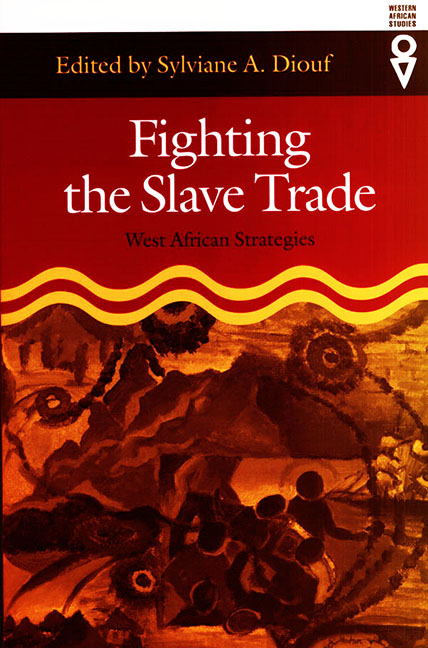Book contents
- Frontmatter
- Contents
- Preface
- Introduction
- PART 1 DEFENSIVE STRATEGIES
- PART 2 PROTECTIVE STRATEGIES
- PART 3 OFFENSIVE STRATEGIES
- 8 Igboland, Slavery, and the Drums of War and Heroism
- 9 “A Devotion to the Idea of Liberty at Any Price”: Rebellion and Antislavery in the Upper Guinea Coast in the Eighteenth and Nineteenth Centuries
- 10 Strategies of the Decentralized: Defending Communities from Slave Raiders in Coastal Guinea-Bissau, 1450–1815
- 11 The Struggle against the Transatlantic Slave Trade: The Role of the State
- 12 Shipboard Revolts, African Authority, and the Transatlantic Slave Trade
- Epilogue: Memory as Resistance: Identity and the Contested History of Slavery in Southeastern Nigeria, an Oral History Project
- Contributors
- Index
8 - Igboland, Slavery, and the Drums of War and Heroism
from PART 3 - OFFENSIVE STRATEGIES
Published online by Cambridge University Press: 30 August 2017
- Frontmatter
- Contents
- Preface
- Introduction
- PART 1 DEFENSIVE STRATEGIES
- PART 2 PROTECTIVE STRATEGIES
- PART 3 OFFENSIVE STRATEGIES
- 8 Igboland, Slavery, and the Drums of War and Heroism
- 9 “A Devotion to the Idea of Liberty at Any Price”: Rebellion and Antislavery in the Upper Guinea Coast in the Eighteenth and Nineteenth Centuries
- 10 Strategies of the Decentralized: Defending Communities from Slave Raiders in Coastal Guinea-Bissau, 1450–1815
- 11 The Struggle against the Transatlantic Slave Trade: The Role of the State
- 12 Shipboard Revolts, African Authority, and the Transatlantic Slave Trade
- Epilogue: Memory as Resistance: Identity and the Contested History of Slavery in Southeastern Nigeria, an Oral History Project
- Contributors
- Index
Summary
IGBOLAND IS AMONG THE AREAS of West Africa that experienced the most intensive slave-trading activities during the seventeenth and nineteenth centuries. Although the total number of Africans enslaved remains unknown, available estimates suggest that about 637,500 Igbo slaves, amounting to 75 percent of the total shipments from the Biafran hinterland, landed in the Americas between 1640 and 1800 (see Oriji 1986). Furthermore, ex-slaves of Igbo ancestry constitute a majority of the population in Bonny, Okirika, and many other eastern delta states that served as depots and exchange centers for European merchants.
Much is already known about how the slave trade was organized in the Igbo hinterland and its impact on local communities (Oriji 1986; see also Oriji 1982; Dike 1956; Ekejiuba 1972; Northrup 1978). But the growing literature on the slave trade provides little insight into the responses it elicited in the hinterland. My research uses oral traditions and other sources to examine how individuals, families, and communities responded to the slave trade and enslavement.
Igbo response differed from one area to the other, and it is necessary to distinguish between the various ecological zones of the region, and explain the degree to which they were either involved in slave trading or subjected to slave raids and the other forms of social violence they engendered. The major ecological zones relevant to this study are
• western Igbo communities, which offer us some of the earliest evidence of slavery in Igboland;
• northern Igboland, including Okigwe, the Enugu-Nsukka area, and the Awka- Onitsha axis, which experienced the most intensive raids and provided the most diverse forms of resistance;
• riverine and coastal towns, whose middlemen sold captives to European traders;
• southeastern Igbo communities, including the homeland of the Aro slave traders and their Abam warriors, who were the main slave dealers in the hinterland;
• southern Igbo communities of Owerri, Mbaise, Ngwa, Asa-Ndokki, Ikwere- Etche, and other places, which were occasionally raided by Abam warriors.
WESTERN IGBOLAND
Cult Slaves, Exiles, and Escapees
Cult slavery is probably one of the most ancient forms of enslavement in Igboland.
Its genesis lies in the holistic cosmology of agrarian Igbo societies dominated by
the earth deity (Ala/Ana), in which there was no separation between religious
power and the judicial and other arms of government.
- Type
- Chapter
- Information
- Fighting the Slave TradeWest African Strategies, pp. 121 - 131Publisher: Boydell & BrewerPrint publication year: 2004



